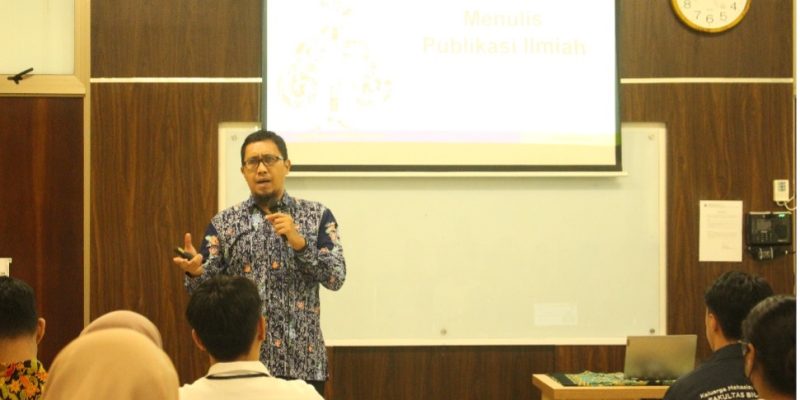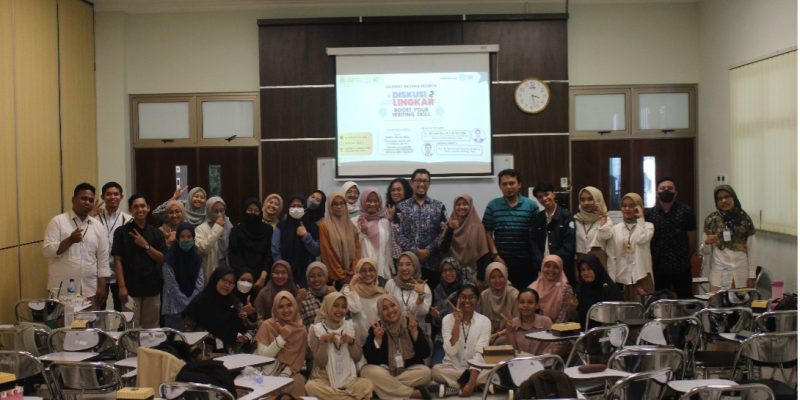On Thursday, September 28, 2023, the Graduate Student Family (Keluarga Mahasiswa Pascasarjana – KMP) of the Faculty of Biology UGM organized the Circle II Discussion Session 1. The activity revolved around the theme “Boost Your Writing Skill,” with the aim of enhancing the writing abilities of graduate students to produce high-quality manuscripts eligible for publication in reputable journals. The event took place in Room 2 on the 1st Floor of the Sinar Mas Building at the Faculty of Biology, UGM, and was attended by 63 participants, consisting of undergraduate, master’s, and doctoral students from the Faculty of Biology, UGM.
The first day’s activities commenced at 07:45 AM WIB, guided by Faradilla, S.Si. as the MC, and began with a collective prayer to bestow blessings and extensive benefits upon the event, continued with the singing of the Indonesian National Anthem, “Indonesia Raya,” the Gadjah Mada Hymn, and the Biology UGM March. Following this, the Circle II Discussion was officially opened with a welcome speech by Dr.rer.nat. Andhika Puspito Nugroho, S.Si., M.Si., representing Prof. Dr. Budi Setiadi Daryono, M.Agr.Sc., the Dean of the Faculty of Biology, UGM, who was unable to attend. During his address, he expressed his appreciation for the Circle II Discussion event as a valuable activity that supports research publication.Dr. Andika emphasized that writing is a complex task, as it requires guidance and direction. In the graduate program, students must take the initiative to write independently. He also emphasized the importance of publishing research data in scientific journals, rather than solely considering it as a final assignment. Furthermore, he encouraged students to participate in various seminars and conferences to add to their Certificate of Academic Achievement (SKPI) issued by the faculty.
The event continued with a presentation by Dr. Miftahul Ilmi, S.Si., M.Si., on “Writing Effectively.” He emphasized that good writing should have a logical structure and flow that is easy to read. He stated that there is no magic formula for a manuscript to be accepted by reputable journals, but there are four essential criteria: an interesting and relevant theme in the field of study, well-designed research that addresses the hypothesis, valid and significant data, and clear publication writing. He also stressed the important principles of being concise, clear, and logical in writing, while cautioning against common mistakes like using convoluted and ambiguous sentences.The second part of the presentation covered the crucial steps in writing a scientific article. The speaker emphasized that authors must be aware of their target audience and the focus of the article. This includes defining the research problem, research objectives, and research conclusions. The steps in writing a manuscript start with the framework, methodology, results, discussion, introduction, title, and abstract. Additionally, meeting deadlines and seeking revisions from mentors or colleagues were highlighted.
After a short break, the discussion continued with topics on “Citation” and “Publication Ethics” by the guest speaker. They explained the importance of citations in providing context to research, presenting ideas, and acknowledging sources of information. Various sources, such as articles, proceedings, thesis books, newspapers, print media, online sources, and personal communication, can be used for citations. The speakers also discussed the significance of key articles at the beginning of the research and updating the list of references during the research process. They pointed out citation practices that need to be scrutinized, including spurious citations, biased citations, self-citing, and excluding contradictory results citations. Additionally, they highlighted publication ethics related to authorship, data falsification, plagiarism, and predatory journals.
The final session provided tips on “Submission Strategies” for articles, such as selecting a potential journal and adhering to the format specified by the target journal. Each presentation by the speakers was followed by enthusiastic questions from the audience. Questions covered topics like valid methodology selection, avoiding citation loops, authorship determination, and tips for writing cover letters to journal editors.
The activities of the first day concluded at 03:30 PM WIB with the presentation of mementos by the KMP Faculty of Biology, UGM. Finally, the event concluded with a group photo of the speakers, participants, and organizers. The Circle Discussion event is expected to become a regularly held activity to meet the needs of graduate students in Biology at UGM in terms of writing, research, and publishing scientific articles.




